Knowde Enhanced TDS
Identification & Functionality
- Chemical Family
- Polymer Name
- Plastics & Elastomers Functions
- Technologies
Features & Benefits
- Labeling Claims
- Materials Features
Applications & Uses
- Markets
- Applications
- Plastics & Elastomers End Uses
- Plastics & Elastomers Processing Methods
- Virtual Reality Application Data
Details
Different Arnitel® grades used in VR headware, combining the excellent skin chemical resistance with comfort, durability and manufacture ability.
Benefits
- Arnitel® offers high elasticity, low creep and high chemical resistance
- Arnitel® offers excellent bonding to substrates like PC without adhesives
- Arnitel® has no skin sensitivity issues
- Conveyor Belts Application Data
Details
Arnitel® ECO is a biobased alternative.Benefits
Arnitel® TPC allows for reliable solutions due to its retention of flexibility even at temperatures down to -40°C or at elevated temperatures up to 100 ˚C, due to its excellent resistance to oxidizing agents and no emission of nitrogen as TPU and due to its wide direct food contact approvals (FDA/EC compliancy)- Optical Fiber Cable Guides and Connectors Application Data
Details
Components used during installation of optical fiber networks inside buildings, the components protect the optical fibers from damaging our pressure, both leading to signal loss, during installation and use.
Benefits
- Arnitel® offers high flexibility in combination with excellent dimensional stability
- Arnitel® allows for ultra thin walls, enabling low cost connectors
- Arnitel® offers easy coloring
- Support Springs Application Data
Details
Low creep flexing solution for slats and mattresses, creating ultimate sleep comfort by changing durometer per section of your bed.
Benefits
- Arnitel® has high creep resistance
- Arnitel® offers a wide range of flexible products, creating the ultimate solution
- Arnitel® offers easy processing, creating design flexibility
- Spider Couplings Application Data
Details
A spider coupling ensures misalignment in metal shaft connections does not affect the lifetime of the couplers. In essence, the spider coupling dampens the initial hit when the shafts start to rotate.
Benefits
- Arnitel® offers high load bearing capabilities at high temperature
- Arnitel® offers excellent low temperature ductility
- Arnitel® has good chemical resistance
- Arnitel® has excellent fatigue properties
- Phone Case Application Data
Details
Product designers and manufacturers increasingly rely on thermoplastic elastomer (TPE) material solutions to produce and deliver highly durable and high-quality soft touch parts. Compared to the thermoplastic polyurethane (TPU) materials traditionally used for soft-touch manufacturing, TPEs offer better resistance to warpage and fatigue, as well as better protection against UV, chemical, and oil exposure.Benefits
- Broad tactile properties with superior touch and feel
- Broadest operating temperature range from -45°C to 150°C
- High tear and abrasion resistance
- High fatigue endurance after 255 compression cycles
Properties
- Flame Rating
- Mechanical Properties
- Thermal Properties
- Electrical Properties
- Rheological Calculation Properties
- Other Properties
- Mechanical Properties (TPE)
- Rheological Properties
| Value | Units | Test Method / Conditions | |
| Yield Stress | 9 | MPa | ISO 527-1/-2 |
| Yield Strain | 45 | % | ISO 527-1/-2 |
| Nominal Strain at Break | >50 | % | ISO 527-1/-2 |
| Charpy Notched Impact Strength (at +23°C) | N | kJ/m² | ISO 179/1eA |
| Charpy Notched Impact Strength (at -30°C) | N | kJ/m² | ISO 179/1eA |
| Izod Notched Impact Strength (at +23°C) | N | kJ/m² | ISO 180/1A |
| Izod Notched Impact Strength (at -20°C) | N | kJ/m² | ISO 180/1A |
| Tensile Notched Impact Strength (at +23°C) | 187 | kJ/m² | ISO 8256/1 |
| Value | Units | Test Method / Conditions | |
| Melting Temperature (10°C/min) | 189 | °C | ISO 11357-1/-3 |
| Vicat Softening Temperature (50°C/h 50N) | 50 | °C | ISO 306 |
| Coefficient of Linear Thermal Expansion (parallel) | 1.6 | E-4/°C | ISO 11359-1/-2 |
| Coefficient of Linear Thermal Expansion (normal) | 1.6 | E-4/°C | ISO 11359-1/-2 |
| Burning Behaviour (at 1.5 mm Nominal Thickness) | UL HB | class | IEC 60695-11-10 |
| Relative Temperature Index (Electrical, 1.5 mm) | 50 | °C | UL746B |
| Relative Temperature Index (with impact, 1.5 mm) | 50 | °C | UL746B |
| Relative Temperature Index (without impact, 1.5mm) | 50 | °C | UL746B |
| Value | Units | Test Method / Conditions | |
| Relative Permittivity (1 MHz) | 4.4 | - | IEC 62631-2-1 |
| Dissipation Factor (1 MHz) | 350 | E-4 | IEC 62631-2-1 |
| Volume Resistivity | 1E11 | Ohm*m | IEC 62631-3-1 |
| Electric Strength | 20 | kV/mm | IEC 60243-1 |
| Comparative Tracking Index | 600 | V | IEC 60112 |
| Value | Units | Test Method / Conditions | |
| Density of Melt | 928 | kg/m³ | - |
| Thermal Conductivity of Melt | 0.1 | W/(m K) | - |
| Specific Heat Capacity Melt | 1800 | J/(kg K) | - |
| Effective Thermal Diffusivity | 5.99E-8 | m²/s | - |
| Value | Units | Test Method / Conditions | |
| Water Absorption | 0.7 | % | Sim. to ISO 62 |
| Humidity Absorption | 0.3 | % | Sim. to ISO 62 |
| Density | 1150 | kg/m³ | ISO 1183 |
| Value | Units | Test Method / Conditions | |
| Tensile Modulus | 85 | MPa | ISO 527-1/-2 |
| Stress at 5% strain | 3.9 | MPa | ISO 527-1/-2 |
| Stress at 10% strain | 6.6 | MPa | ISO 527-1/-2 |
| Stress at 50% strain | 9.2 | MPa | ISO 527-1/-2 |
| Stress at 100% strain | 9.3 | MPa | ISO 527-1/-2 |
| Stress at 300% strain | 11.8 | MPa | ISO 527-1/-2 |
| Stress at Break | 23 | MPa | ISO 527-1/-2 |
| Strain at Break | >300 | % | ISO 527-1/-2 |
| Nominal Strain at Break | 800 | % | ISO 527-1/-2 |
| Compression Set Under Constant Strain (at 70°C) | 50 | % | ISO 815 |
| Tear Strength | 100 | kN/m | ISO 34-1; Method B |
| Shore D Hardness (3s) | 40 | - | ISO 868 |
| Value | Units | Test Method / Conditions | |
| Melt Volume-Flow Rate (at 230 / * °C, 2.16 / * kg) | 46 | cm³/10min | ISO 1133 |
| Molding Shrinkage (parallel) | 1.25 | % | Sim. to ISO 294-4 |
| Molding Shrinkage (normal) | 1.5 | % | Sim. to ISO 294-4 |
Regulatory & Compliance
- Certifications & Compliance
- OEM Specifications
- OEM Standards
- Quality Standards
Technical Details & Test Data
- Dynamic Shear Modulus (G)-Temperature
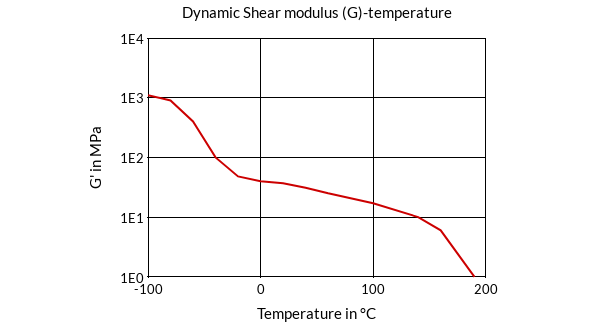
- Chemical Resistance
Chemical Type Chemical Name Resistance Other Acetic acid (10% by mass) at 23°C resistant Ketones Acetone at 23°C resistant Other Ammonium hydroxide (10% by mass) at 23°C limited resistant, tests necessary to verify Other ASTM 1 at 23°C resistant Other ASTM 3 at 23°C resistant Other Brake fluids (DOT 3/4) at 23°C not resistant Other Calcium chloride (10% by mass) at 23°C limited resistant, tests necessary to verify Other Chloroform at 23°C not resistant Ethers Diethyl ether at 23°C limited resistant, tests necessary to verify Alcohols Ethanol at 23°C limited resistant, tests necessary to verify Other Ethyl Acetate at 23°C limited resistant, tests necessary to verify Other Fuel; Diesel at 85°C resistant Other Hydrochloric acid (10% by mass) at 23°C resistant Other Hydrogen peroxide (30% by mass) at 23°C limited resistant, tests necessary to verify Other Nitric acid (10% by mass) at 23°C resistant Other Phosphoric acid (10% by mass) at 23°C resistant Other Sodium hydroxide (10% by mass) at 23°C resistant Other Sulfuric acid (30% by mass) at 23°C resistant Other Tetrachloroethylene at 23°C limited resistant, tests necessary to verify Hydrocarbons Toluene at 23°C resistant Other Transformer oil at 23°C not resistant Other Trichloroethylene at 23°C not resistant Other Water at 23°C resistant Other Zinc chloride (10% by mass) at 23°C resistant - Shearstress-Shear Rate
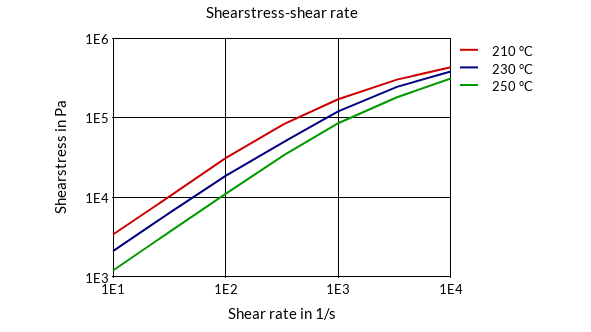
- Specific Volume-Temperature (pvT)
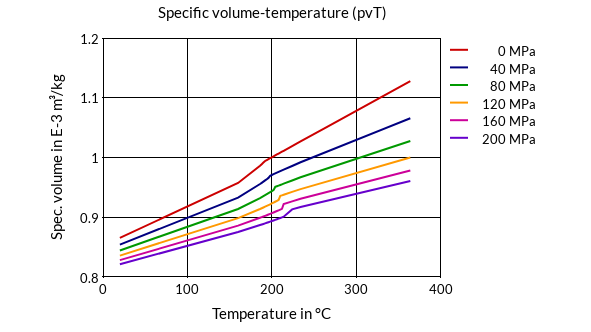
- Stress-Strain (isochronous) 23°C
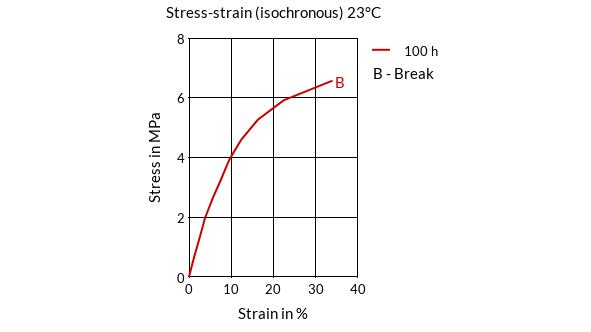
- Stress-Strain (TPE)
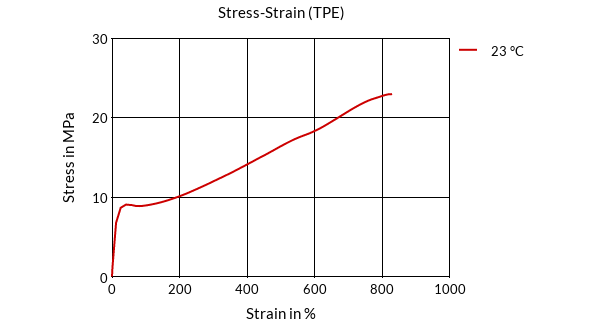
- Viscosity-Shear Rate
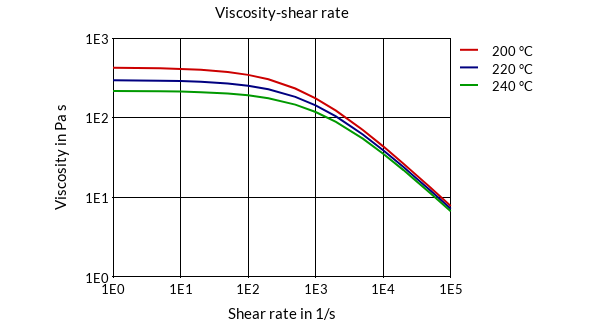
Packaging & Availability
- Packaging Type

